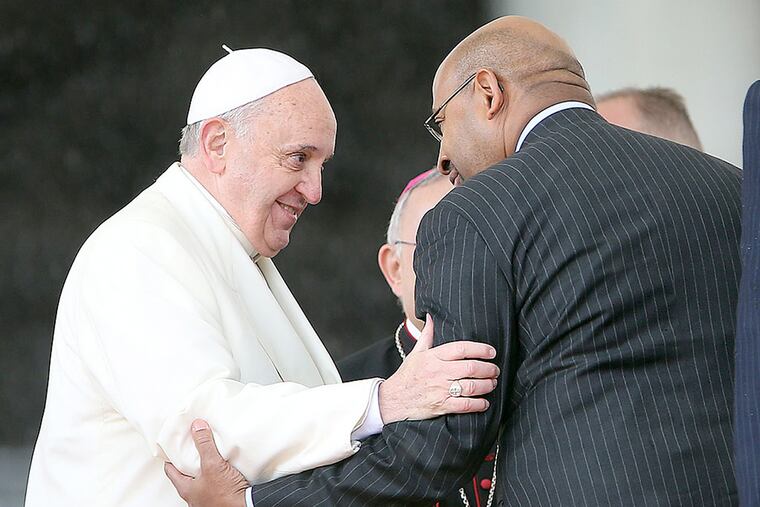Mixed blessing
Remember when things were simple? Last summer, asked whether the public would have to pay for Pope Francis' visit, Mayor Nutter's spokesman replied succinctly, "The city is not sharing costs." The Philadelphia Archdiocese's spokesman was straightforward, too, saying the church's World Meeting of Families would be "responsible for bearing the burden of all costs associated with the events."

Remember when things were simple? Last summer, asked whether the public would have to pay for Pope Francis' visit, Mayor Nutter's spokesman replied succinctly, "The city is not sharing costs." The Philadelphia Archdiocese's spokesman was straightforward, too, saying the church's World Meeting of Families would be "responsible for bearing the burden of all costs associated with the events."
Lately, though, things have gotten complicated. Last month, the Daily News found Deputy Mayor Everett Gillison addressing the same issue amid a sudden profusion of caveats: "Some people would say, 'Well, World Meeting of Families is going to pay for all costs.' I always said, 'No, they're not,' because it's not fair. Some things that we bought we are going to consume the rest of this year. I can't give that to somebody to pay for."
In case that wasn't unclear enough, the mayor himself made it muddier in an interview with The Inquirer this month: "What I said, what I thought I said, and certainly what I meant is, they would be billed for additional costs that went with the actual two-day event in the City of Philadelphia." The archdiocese had a new catechism too: "It is our understanding that the World Meeting of Families' agreement with the city was based on previous agreements that the city has made with other organizations for large-scale events. Our agreement reflects past precedent."
All this was by way of at long last admitting that by "all," the mayor meant "about half." The administration has now acknowledged that of the $17 million the city expended on the pope's visit, some $8 million will become an unwilling indulgence of taxpayers.
Tellingly, the city's assumed costs are roughly equivalent to what it spent on police overtime during Francis' visit, which was accompanied by an overweening security posture that drove away residents, paralyzed the local economy, and frustrated pilgrims, many of whom waited hours to attend Francis' Parkway Mass to no avail. Despite widespread criticism leading up to the event, the city and the Secret Service barreled ahead with plans that brought much of Center City to a standstill.
Especially given Philadelphia's poverty, the religious nature of the event, and the city's history of disputed expenses for a prior papal visit, the administration should have hesitated to subsidize a church event so generously. And the bill at hand doesn't even include the expenses of suburban, state, and federal agencies.
Granted, the papal visit was a massive undertaking and a boon to the city in mostly intangible ways. And it's not inconceivable that some of the costs incurred should be the city's responsibility. But the mayor should have made that case when asked. Instead, even when the event was just weeks away, he flatly and disingenuously insisted, "We're getting reimbursed."
In the waning days of the Nutter administration, the entire episode leaves another distinct impression of a qualified success tarnished by a taciturn and seemingly condescending attitude that unfortunately has become all too familiar to Philadelphians over the last eight years.